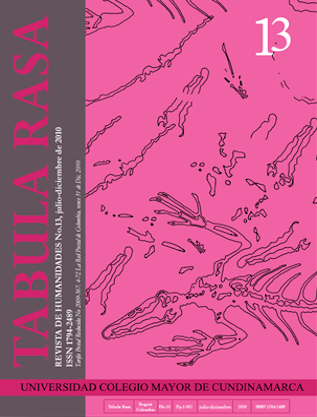Trajectories of blackness: an open reading of the encounters that produce contingent definitions of lo negro in Latin America
Trayectorias de negridad: disputas sobre las definiciones contingentes de lo negro en América Latina
Show authors biography
This article traces a genealogy of the concept of blackness in Latin America by reviewing historical and anthropological literature that, though not always centrally concerned with the production of blackness, nonetheless reveals how ideas about blackness have traveled across time and space. I begin in the colonial period in order to give due attention to the fierce battles to define and unsettle the category of the African slave. Then, I look at various incarnations of Latin American nationalisms—whitening, mestizaje, and multiculturalism—in order to evince how nation-making projects have produced changing definitions of blackness. Finally, I break loose from the nationalist bind to consider diasporic forms of blackness. While producing somewhat of a chronological narrative, I consider a variety of categories—labor, race, ethnicity, sexuality, and nation—which have at times been more or less salient in defining the category of difference that I refer to as blackness.
Article visits 132 | PDF visits 110
Downloads
Helg, Aline. 2004. Liberty & equality in Caribbean Colombia, 1770-1835. Chapel Hill: University of North Carolina Press.
Herskovits, Melville. 1941. The Myth of the Negro Past. Nueva York: Harper. Helg, Aline. 1943. “The Negro in Bahia, Brazil: A Problem in Method”. American
Sociological Review 8(4):394-404.
Hine, Darlene Clark y Jacqueline McLeod. 1999. Crossing Boundaries: Comparative History of Black People in Diaspora. Bloomington: Indiana University Press.
Hoetink, H. 1973. Slavery and Race Relations in the Americas; Comparative Notes on their Nature and Nexus. Nueva York: Harper & Row.
Hooker, Juliet. 2005. “Indigenous Inclusion/Black Exclusion: Race, Ethnicity and Multicultural Citizenship in Latin America”. Journal of Latin American Studies. 37(2):285(26).
Ianni, Octavio. 1972. Raças e classes no Brazil. Rio de Janeiro: Editora Civilização Brasileira.
James, C. L. R. 1938. The Black Jacobins: Toussaint L’Ouverture and the San Domingo Revolution. Londres: Allison & Busby.
Kelley, Robin D. G. 2003. Freedom Dreams: The Black Radical Imagination. Boston: Enfield, Beacon, Airlift.
Knight, Alan. 1990. “Racism, Revolution, and Indigenismo: Mexico, 1910-1940”. En: The Idea of race in Latin America, 1870-1940. R. Graham, T.E. Skidmore, A. Helg, A. Knight, y American Council of Learned Societies (eds.). Austin: University of Texas Press.
Kutzinski, Vera M. y A. James Arnold. 1993. Sugar’s Secrets: Race and the Erotics of Cuban Nationalism. Charlottesville: University Press of Virginia.
Lander, Edgardo y Santiago Castro-Gómez. 2000. La colonialidad del saber: eurocentrismo y ciencias sociales: perspectivas latinoamericanas. Buenos Aires: CLACSO.
Larraín, Jorge. 2000. Identity and Modernity in Latin America. Oxford: Blackwell.
Lewis, Laura. 2001. “Of Ships and Saints: History, Memory, and Place in the Making of Moreno Mexican Identity”. Cultural Anthropology 16(1):62-82.
Lombardi, John V. 1971. The Decline and Abolition of Negro Slavery in Venezuela, 1820-1854.
Westport: Greenwood.
Martínez-Alier, Verena y University of Oxford. 1970. Marriage, Class and Colour in Nineteenth-Century Cuba. Cambridge: Cambridge University Press.
Marx, Anthony W. 1998. Making Race and Nation: A Comparison of South Africa, the United States, and Brazil. Cambridge: Cambridge University Press.
Maya Restrepo, Luz Adriana. 2005. Brujería y reconstrucción de identidades entre los africanos y sus descendientes en la Nueva Granada, siglo XVII. Bogotá: Ministerio de Cultura.
Meade, Teresa A. 1997. “Civilizing” Rio: Reform and Resistance in a Brazilian City, 1889-1930. University Park: Pennsylvania State University Press.
Mignolo, Walter D. 2000. Local Histories/Global Designs: Coloniality, Subaltern Knowledge’s, and Border Thinking. Princeton: Princeton University Press.
Mintz, Sidney Wilfred. 1986. Sweetness and Power: The Place of Sugar in Modern History. Nueva York: Penguin Books.
Moreno Fraginals, Manuel. 1964. El ingenio; el complejo económico social cubano del azúcar. La Habana: Comisión Nacional Cubana de la UNESCO.
Mosquera, Claudia, Mauricio Pardo y Odile Hoffmann. 2002. Afrodescendientes en las Américas: trayectorias sociales e identitarias: 150 años de la abolición de la esclavitud en Colombia. Bogotá: Universidad Nacional de Colombia.
Múnera, Alfonso. 2005. Fronteras imaginadas: la construcción de las razas y de la geografía en el siglo XIX colombiano. Bogotá: Editorial Planeta Colombiana.
Ng’weno, Bettina. 2003. “Overview of Titling ‘Collective Territories for Black Communities’ in Colombia”. En: Ford Foundation Project on Afro-Latin Land Rights in Central and South America. Pearl Lagoon, Nicaragua.
Ng’weno, Bettina. 2007. Turf Wars: Territory and Citizenship in the Contemporary State. Stanford: Stanford University Press.
Offen, Karl. 2003. “The Territorial Turn: Making Black Territories in Pacific Colombia”. Journal of Latin American Geography 2(1):43-73.
Oslender, Ulrich. 1999. «Espacio e identidad en el Pacífico colombiano». En: De montes, ríos y ciudades: territorios e identidades de gente negra en Colombia. J. Camacho y E. Restrepo (eds.). Bogotá: Ecofondo, Natura, Instituto Colombiano de Antropología.
Oslender, Ulrich. 2002. “‘The Logic of the River’: A Spatial Approach to Ethnic-Territorial Mobilization in the Colombian Pacific Region”. Black Identity and Social Movements in Latin America: The Colombian Pacific Region 7(2):86-117.
Pierson, Donald. 1942. Negroes in Brazil. Carbondale: Southern Illinois University Press.
Pollak-Eltz, Angelina. 1991. La negridad en Venezuela. Caracas: Lagoven.
Pratt, Mary Louise. 1992. Imperial Eyes; Travel Writing and Transculturation. Nueva York: Routledge.
Quijano, Aníbal. 2000. «Colonialidad del poder, eurocentrismo y América Latina». En: La colonialidad del saber: eurocentrismo y ciencias sociales: perspectivas latinoamericanas. E. Lander y S. Castro-Gómez (eds.). Buenos Aires: CLACSO.
Rama, Ángel. 1995. La ciudad letrada. Montevideo: Arca.
Reis, João José. 1995. Slave Rebellion in Brazil: The Muslim Uprising Of 1835 in Bahia.
Baltimore: Johns Hopkins University Press




